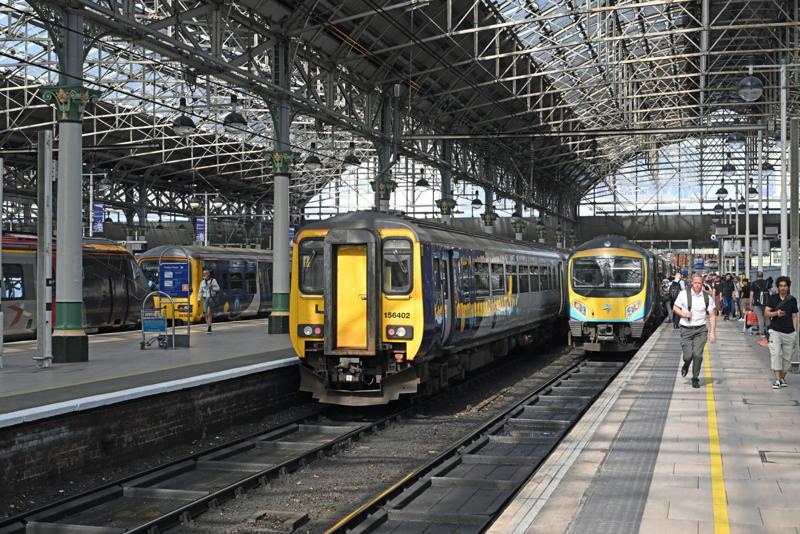
The Liverpool-Manchester Rail partnership is “not a pipe dream”, according to former Rail Minister Huw Merriman, who chairs the project.

The Liverpool-Manchester Rail partnership is “not a pipe dream”, according to former Rail Minister Huw Merriman, who chairs the project.
Speaking to RAIL after the Liverpool-Manchester Railway Partnership Board called on the government to commit to the planning and construction of a new line, in the upcoming spending review, Merriman said: “It’s way beyond the stage of something on paper. It’s a project which has real legs and potential - and that’s what we want the government to see. So far, the response has been receptive to the idea.”
The board, which includes civic leaders such as Greater Manchester Mayor Andy Burnham and Liverpool City Region Mayor Steve Rotheram, wants the project to be included in the government’s ten-year Infrastructure Strategy which is due to be published over the coming months.
In a new report, the board says a new Manchester-Liverpool line has the potential to provide a £15 billion boost to the economy and generate 22,000 jobs during construction.
For that potential to be met, however, Merriman believes that lessons need to be learned from past projects.
“It’s a bold and ambitious plan, but we want to do things differently. It would be such a waste if we did not learn the lessons from the past, which includes HS2.
“We need to plan properly and take our time doing it. That will mean doing all of that up front, before any spades hit the ground.
The project was originally pledged by the Conservative government of Boris Johnson, which committed nearly £4 billion. It also formed part of Rishi Sunak’s Network North programme, with £12bn promised from the cancellation of HS2 Phase 2b promised.
In total, the previous Conservative government pledged £17bn to the project, although a pledge was as far as it went. So far, the Labour administration has not re-committed that money.
“We’re asking for a financial commitment for at least the first phase to allow us that space to plan. Because that’s the most important part of this project at the start, to ensure costs are kept feasible. After that, a longer-term commitment to ensure it is delivered.”
The proposed route would run from Liverpool Lime Street to new underground through-platforms at Manchester Piccadilly, with intermediate stops at Liverpool Gateway, Warrington Bank Quay and Manchester Airport.
A phased delivery is proposed, starting with the section from Millington to Manchester Piccadilly.
The board is encouraging the government to continue with the Hybrid Bill for the section of line that was originally due to be part of HS2 Phase 2b, as well as the Liverpool-Manchester Railway. The bill was part of the King’s Speech in 2024.
The second phase would be the section west towards Warrington Bank Quay, where new low-level platforms would connect with the West Coast Main Line.
West of Warrington, the precise alignment hasn’t been confirmed, although it’s set to at least follow part of the new redundant freight route passing the decommissioned Fiddlers Ferry Power Station and Widnes.
Merriman insists, however, that the Liverpool-Manchester proposal was not in place of any possible new connection between Birmingham and Manchester.
“I firmly believe that HS2 will in some form reach Manchester. Right now, we’re focused on this proposal. But this project can help build a case for a connection between Manchester and Birmingham, because it is for the betterment of the region as a whole and we want that connectivity.”
Those behind the project also insist the plan is about making better use of the network to enable "significantly more trains to run" and create more space in trains, rather than purely tempting people from the existing routes to a new line. Both regional mayors added that the time was right for backing from government.
Rotheram said: “We’re putting forward a serious, deliverable plan that does things differently - developing plans at a regional level instead of a top-down approach,” said Rotheram.
“Not cap in hand, but shoulder to shoulder with government.”
Burnham added: “A new Liverpool-Manchester Railway would be shorter than both London’s Elizabeth line and East West Rail connecting Oxford and Cambridge, but would punch well above its weight in both growing the UK’s economy and better connecting our high-growth sectors.”
Login to continue reading
Or register with RAIL to keep up-to-date with the latest news, insight and opinion.


















Login to comment
Comments
No comments have been made yet.